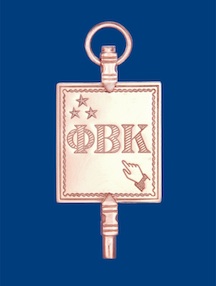By Justin Nalos
On December 4, the Phi Beta Kappa Society launched its National Arts and Sciences Initiative at the Woolly Mammoth Theatre in Washington, D.C.
With approximately 200 guests in attendance, the Initiative launch reception consisted of a Keynote speech presented by Shankar Vedantam, Science Reporter of NPR, and an awards ceremony that recognized Senator Lamar Alexander (ΦBK, Vanderbilt University, 1962) and Representative Rush Holt (ΦBK, Carleton College, 1970) as recipients of the Phi Beta Kappa 1776 Award and Arizona State University’s Project Humanities, the recipient of the Key of Excellence Award, accepted by Neal Lester, Director.
The National Arts and Sciences Initiative aims to raise awareness about the benefits of a liberal arts and sciences education. The campaign will energize members to deliver three core messages to decision makers: an arts and sciences education expands opportunity; an arts and sciences education drives ingenuity and innovation; and lastly, an arts and sciences education is an investment in America.
The National Arts and Sciences Initiative will mobilize a number of Phi Beta Kappa’s 500,000+ members to advocate for policies that bolster the value of an arts and sciences education to policy makers who hold higher education in trust. Susan K. Hagen, a Phi Beta Kappa Senator, said of the initiative, “I hope that with the full membership of Phi Beta Kappa, we can take this back to chapters, to local associations, and start a grassroots movement of support to legislators and business people. It can have a tremendous effect.”
The awards ceremony consisted of the presentation of the Phi Beta Kappa 1776 Award and the Key of Excellence Award. Senator Lamar Alexander (R-Tennessee) and Congressman Rush Holt (D-New Jersey) received The Phi Beta Kappa 1776 award, which is a recognition of an awardee’s commitment and support for the arts and sciences. Reflecting on his award, Senator Alexander said, “One of the most important ways to understand human nature is to study it, and I’m honored to work with organizations like the Phi Beta Kappa Society to show the importance of arts and sciences in education.”
The Key of Excellence Award is a new award that is designed to exhibit innovative programs that reflect the “excellence, range, and relevance of the arts and sciences to their communities.” The inaugural award was presented to Arizona State University’s Project Humanities, a university-wide multi-disciplinary initiative that “promotes and showcases the range, relevance and diversity of faculty and student humanities research and outreach.” Neal A. Lester, Director of Project Humanities, said, “My goal is to launch and to build a robust investment in this Humanity 101, initiative-creating movement…We want programs built, and we want people energized and excited so this becomes a movement.” Project Humanities has sponsored or co-sponsored over 100 programs that emphasize the importance of promoting and sustaining the arts and sciences across multiple disciplines and the community at large.
The importance of the arts and sciences was a sentiment that echoed throughout the night, as each and every speaker emphasized the importance of a broad-based education. With the National Arts and Sciences Initiative, the Phi Beta Kappa Society hopes to start a movement where communities will understand and champion the value of the arts and sciences as an investment in opportunity, ingenuity, and future success.
Justin Nalos is a senior at Howard University majoring in English. Howard University is home to the Gamma of the District of Columbia Chapter of Phi Beta Kappa.




